Safest Cities in South Korea for Women to Live
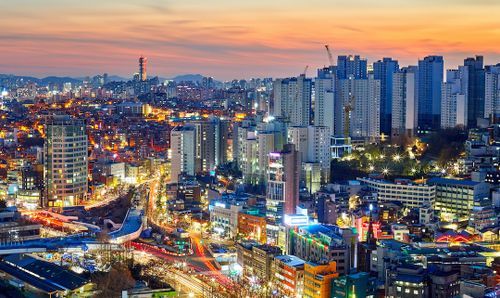
1, Seoul
Seoul, the bustling capital of South Korea, is situated on the banks of the Han River, nestled amid scenic hills in the northwestern part of the country. Embroidered with a harmonious blend of traditional and modern, Seoul is renowned for its vibrant culture, advanced technology, thriving K-pop scene, mesmerizing palaces and Zen Buddhist temples. It is a fast-paced cosmopolitan city that never sleeps, evident in the lively nightlife of places like Hongdae and Itaewon. World-famous attractions like Gyeongbokgung Palace, N Seoul Tower, Bukchon Hanok Village, and the bustling shopping district of Myeong-dong capture the hearts of millions of international tourists each year. The city's dynamic gastronomy scene also invites visitors to taste the wonders of Korean cuisine, including the famous kimchi, bulgogi, and bibimbap.
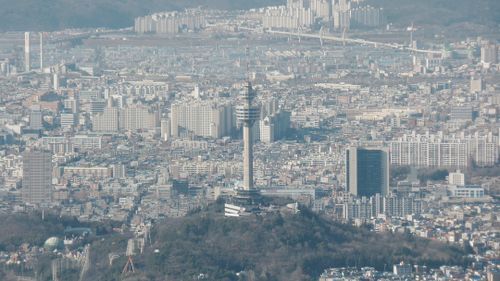
2, Daegu
Situated in the southeastern region of South Korea, Daegu is the fourth largest city in the country, a vibrant hub admired for its dynamic blend of old and new. Recognized for its thriving textile industry, Daegu is often referred to as the "Fashion City" of Korea. This unique identity of Daegu is portrayed in every aspect of the city, including its modern shopping centres that are contrasted by traditional markets like Seomun Market. Moreover, the city also boasts of its flourishing cultural scene, exemplified by the Daegu Opera House and numerous festivals such as the Daegu International Bodypainting Festival. Daegu’s rich history is ever-present in its Buddhist heritage sites, such as the Donghwasa Temple, exhibiting an exquisite balance of historical depth and futuristic innovation.
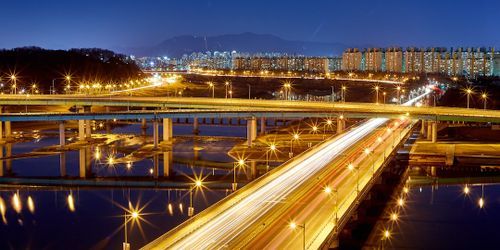
3, Daejeon
Daejeon, located in the central region of South Korea, carries a distinctive appeal for both science enthusiasts and nature lovers. As South Korea's fifth-largest metropolis, Daejeon is known as the Silicon Valley of South Korea, boasting an impressive array of research institutes, universities, and technology corporations, including the Korea Advanced Institute of Science and Technology (KAIST). It's not all science and technology though; Daejeon is also home to stunning natural beauty with the scenic beauty of Gyeryongsan National Park. The city is famed for its hot springs, particularly Yuseong Hot Springs, offering a perfect relaxation spot. With a plethora of cultural experiences, such as the Daejeon Museum of Art and Daejeon Hanbat Arboretum, travelers can enjoy a unique blend of modernity, tradition, and natural wonders.
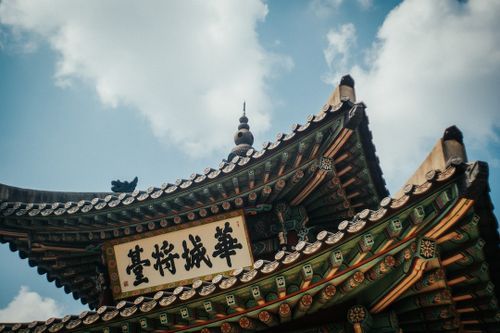
4, Suwon
Situated just south of the bustling metropolis of Seoul, Suwon, South Korea offers a vibrant blend of traditional culture and modern sophistication. This dynamic city, encircled by UNESCO World Heritage-designated Hwaseong Fortress, is famous for its exquisite Korean culinary scene, particularly popular for its local specialty, the delectable Suwon Galbi. Suwon further endears its locals and visitors alike with attractions such as the Korean Folk Village, where time seems to stand still, and the lively markets at Paldalmun Gate. The city also houses the Samsung Innovation Museum and Suwon I'Park Museum of Art, making it a significant hub for technology and art enthusiasts. A trip to Suwon equates to a journey through history, culture, and innovation.
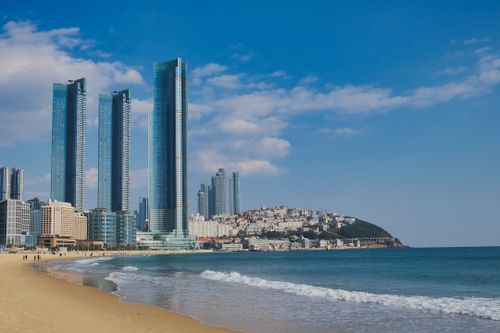
5, Busan
Located on the southeast coastline of South Korea, Busan is the country's second largest city known for its stunning beaches, magnificent mountains, and a vibrant culture. It is a flourishing metropolitan area with a unique blend of towering skyscrapers and historical temples. The city is famous for its seafood-centric cuisine, with the bustling Jagalchi Fish Market offering a plethora of fresh seafood. Busan's Haeundae Beach is renowned for its sunrises and bustling film festivals, while the Beomeosa Temple nestled within the mountains offers serene spiritual retreats. Visitors can also explore the glamourous film sets of Busan Cinema Studio or immerse themselves in the radiant local life at the Gukje Market. Whether it's contemporary city life or rich cultural experiences, Busan delivers a versatile spectrum of Korean attractions.

6, Pyeongtaek-si
Pyeongtaek-si, a vibrant city nestled in the Gyeonggi Province of South Korea, is strategically located about 70 kilometers south of Seoul, making it a convenient escape from the bustling capital. This dynamic city is renowned for its thriving economic landscape, most notably as the home of Camp Humphreys, the largest U.S. military base overseas, which infuses a rich multicultural essence into the local tapestry. Visitors can immerse themselves in the seamless blend of tradition and modernity with attractions such as the serene Naeri Botanic Garden and the bustling Pyeongtaek Port, one of Korea’s busiest international trade hubs. Culinary enthusiasts can indulge in the city's famous Korean beef, or "hanu," while exploring local markets that offer a diverse array of Korean street food delights. Pyeongtaek-si, with its blend of modern amenities, cultural experiences, and scenic landscapes, offers a unique glimpse into both the past and future of South Korea.
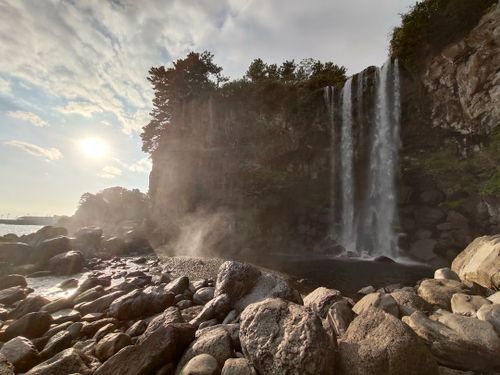
7, Seogwipo
Located on the stunningly beautiful Jeju Island, Seogwipo, South Korea, serves as a vibrant hub showcasing unrivaled natural beauty, rich cultural heritage, and a kaleidoscope of unique attractions. Nestled on the southern coast of the island, it's famous for its three towering waterfalls - Cheonjiyeon, Jeongbang, and Cheonjeyeon - that dramatically plunge into the sea. Seogwipo's awe-inspiring coastal cliffs, most striking at Jungmun Daepo Coast 'Jusangjeollidae', and emerald seas delight nature lovers. The city also features the natural wonder of Hallasan Mountain, South Korea's highest peak, and houses a well-regarded citrus museum, a testament to the area's famous sweet tangerines. The city’s vibrant art scene is demonstrated by the Lee Jung-Seop Art Gallery and is celebrated during the annual Seogwipo International Art Festival. Immensely popular among tourists, Seogwipo offers an enchanting blend of natural beauty, cultural attractions, and authentic Korean cuisine.
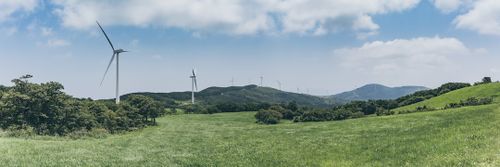
8, Pyeongchang
Pyeongchang, a picturesque county nestled in the Taebaek Mountains of South Korea, is particularly lauded for its captivating natural beauty and wonderful sporting infrastructure. Known worldwide for hosting the 2018 Winter Olympics, this globally acclaimed destination harmonizes modernity with tradition as it boasts magnificent Ski resorts like Alpensia and Yongpyong, thrilling snow activities, and a remarkable Olympic museum. Alongside its wintry pursuits, Pyeongchang is also home to the stunning Woljeongsa Temple, which adds a rich cultural layer to its charm. Offering a diverse blend of action, heritage, and tranquility, Pyeongchang invites travelers to explore its snowy slopes, savor its scenic vistas, and immerse themselves in its vibrant heritage.
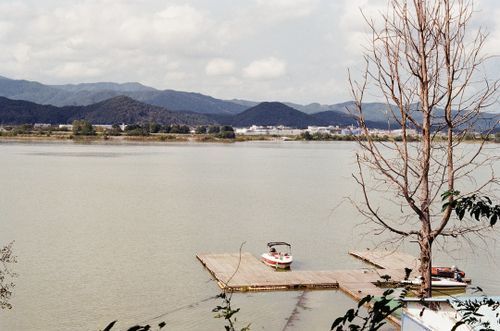
9, Chuncheon
Chuncheon, South Korea, located northeast of Seoul, is a stunning blend of natural beauty and vibrant culture. The city is nestled in the mountains and surrounded by expansive lakes and rivers, earning it the nickname "City of Lakes". Chuncheon is renowned worldwide for its annual Mime Festival, the largest of its kind in Asia, which attracts performers and tourists from around the globe. Food lovers flock to its bustling Myeongdong Dakgalbi Street, famed for signature spicy chicken dish, Dakgalbi. The iconic Nami Island, a mecca for Korean pop culture fans famous for its tree-lined avenues that have been featured in numerous Korean television dramas, is also a short ferry trip away. This tranquil city showcases a piece of South Korea that contrasts with its fast-paced urban counterparts.
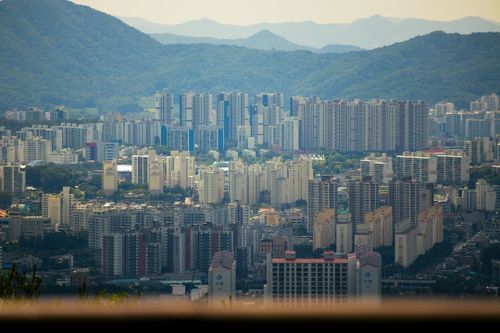
10, Wonju
Located in the heart of the Gangwon Province, South Korea, Wonju is a vibrant city, bearing a blend of rich history and stunning natural beauty. This dynamic city is known for being the center of the Korean Dynasties, evidenced by numerous historic sites including the Guryongsa Temple and Museum SAN, a treasure trove of cultural artifacts. Visitors here are also captivated by the panoramic mountain sceneries that encircle Wonju, particularly the enchanting Chiaksan National Park, famed for its diverse flora and fauna, and thrilling hiking trails. The city is also celebrated for its Wonju Hanji festival, spotlighting the city's traditional Korean paper industry.
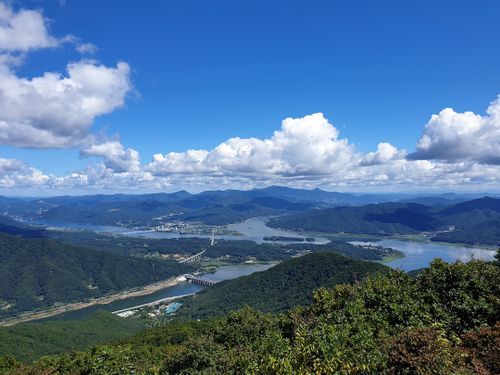
11, Namyangju
Namyangju is a serene city located in the Gyeonggi Province in South Korea, nestled along the bucolic banks of the Han River, just east of Seoul. The city offers a delightful blend of urban sophistication and rustic charm, featuring various stunning landscapes like the semi-mountainous terrains of Cheonmasan, Suraksan, and Ungilsan. Legendary for being the birthplace of traditional Korean Poet, Heungbu, the city is known as the 'City of Culture'. From the local organic food movement to the nuances of Korean cinema at the Namyangju Film Studios and the serene backdrops of the Dumulmeori and the Dasan Heritage Site, Namyangju urban exuberance is blended seamlessly with its rich cultural heritage and natural beauty, making it a must-visit destination for every travel enthusiast.
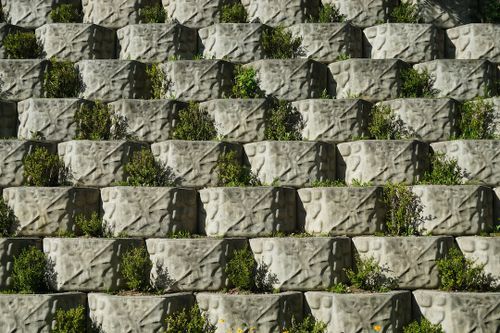
12, Yongin
Located in the Gyeonggi province of South Korea, Yongin is a bustling city renowned for its alluring charm and array of attractions. Yongin is a traveler’s delight, where the traditional meets the technological marvel - the city is home to Korean Folk Village which offers a glimpse into the rich cultural heritage of the country, and Everland and Caribbean Bay, South Korea's largest theme and water parks. Yongin also boasts of the internationally recognized Yongin University and the technologically advanced Samsung Digital City. Whether it's food, shopping, or seeking thrill in amusement parks, Yongin offers diverse experiences that cater to the interests of every type of traveler.
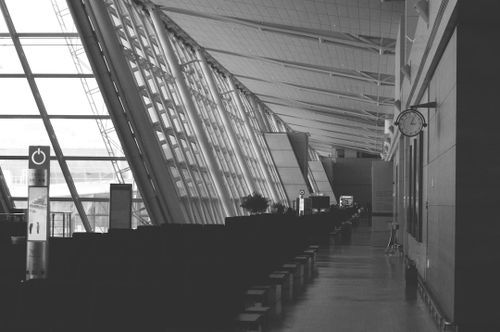
13, Incheon
Incheon, the third-largest city in South Korea, is located in the northwest of the country, bordered by the capital city, Seoul, and the Yellow Sea. It's renowned for its high-tech port, beautiful parks, and historic Chinatown district. Known as the gateway to Korea, Incheon is famous for its international airport, which is one of the busiest in the world. The city's attractions include Wolmido Island with its carnival-like atmosphere, Songdo International Business District known as "South Korea's City of the Future" with its cutting-edge urban planning, and the Incheon Grand Park, a vast green space perfect for leisure activities. Incheon's vibrant nightlife, delectable seafood, and the exciting annual event – the Incheon Korean Music Wave, collectively grace the city with a multifaceted charm that attracts tourists from all over the world.
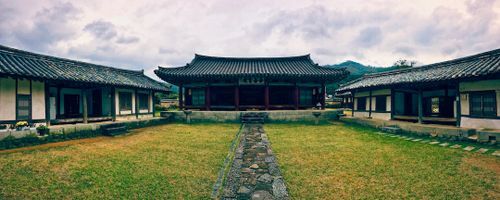
14, Gyeongju
Gyeongju, located on the southeastern coast of South Korea, is a city known as the "museum without walls" due to its rich historical significance. As the ancient capital of the Silla Dynasty, the city is teeming with archaeological sites and cultural treasures, including royal tombs, ancient temples, and palace ruins. It's home to the UNESCO World Heritage Sites, Bulguksa Temple and Seokguram Grotto, known for their breathtaking architecture and Buddhist art. The city also boasts the stunning natural scenery of Gyeongju National Park alongside other attractions like the Gyeongju National Museum and Anapji Pond which offer immersive experiences into Korea's traditional culture and history. Gyeongju provides a unique fusion of history, culture, and natural beauty that leaves every visitor enchanted.
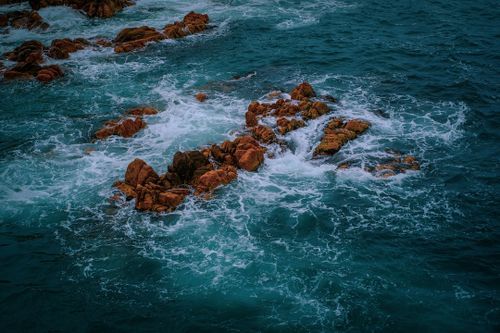
15, Ulsan
Ulsan, located in the southeast of South Korea along the Sea of Japan, is a captivating blend of industrial advancement and natural beauty. Known as the heart of the country's automobile and shipbuilding industries, Ulsan houses the world's largest automobile assembly plant run by Hyundai Motors, as well as the world's largest shipyard operated by Hyundai Heavy Industries. However, it's not just about industry in Ulsan – the city is also famed for its scenic coastal areas with beautiful beaches and dramatic cliffs, such as Ilsan Beach and Daewangam Park. Visitors are also drawn to Ulsan's resplendent Grand Parks and whale-watching attraction at Jangsaengpo Whale Museum, lending the city an exciting mix of urban buzz and natural allure.
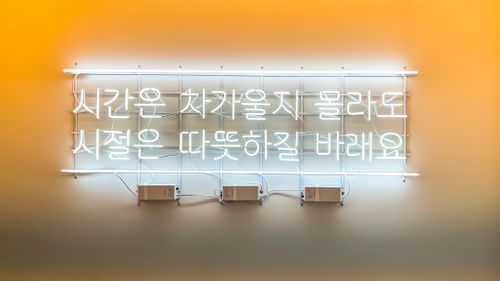
16, Sejong City
Sejong City, located in the central region of South Korea, is a meticulously planned administrative municipality that presents an enchanting fusion of tradition and modernisation, surrounded by breathtaking mountains and vibrant green landscapes. Known as the de facto administrative capital, Sejong is home to government buildings and important national offices, moving away from the congestion of Seoul. The city is a depiction of advanced urban planning and is celebrated for its smart features, lush garden spaces, and efficient public transportation. Despite its official connections, Sejong boasts a wealth of experiences for tourists, offering attractions such as the awe-inspiring Geumgang River, verdant Hansol Oak Valley Golf Course, and the interactive National Institute of Ecology, alluring visitors with its unique character and charm.

17, Muju-gun
Muju-gun, located in the North Jeolla Province of South Korea, is a hidden gem for outdoor enthusiasts and adventure lovers. Known for its stunning natural beauty, Muju-gun features Deokyusan National Park, which is blanketed with lush forests and a picturesque landscape especially during winter, attracting skiers and snowboarders to the iconic Muju Deogyusan Resort. The area is also famous for the Muju Firefly Festival, a major event drawing visitors worldwide to marvel at the spectacle of thousands of fireflies illuminating the night sky, with traditional folk games and performances adding to its charm. With its harmonious blend of natural wonder and rich culture, Muju-gun offers a captivating retreat offering glimpses into South Korea's enthralling beauty and cultural heritage.
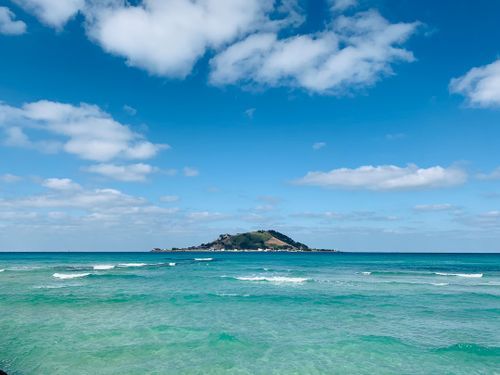
18, Jeju
Jeju Island, commonly known as Jeju, is a beautiful island located in the Korea Strait, just off the southern coast of South Korea. Known as the "Island of the Gods," it boasts a natural landscape of volcanic rock, stunning waterfalls, and dense lush forests. Renowned for its unique volcanic topography and charming coastal aesthetics, Jeju is home to UNESCO World Heritage Sites such as the Manjanggul Cave, which has one of the longest lava tubes in the world, and the Seongsan Ilchulbong, an extraordinary tuff cone formed by hydrovolcanic eruptions. Its clean and temperate climate, combined with the distinct traditional culture reflected in its local dialect, cuisines, and folk practices, makes Jeju a beloved holiday destination in Asia.
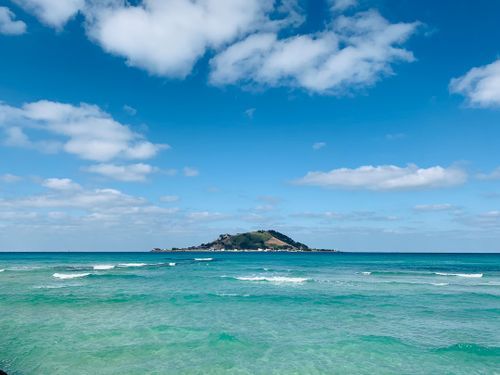
19, Jeju Island
Jeju Island, a picturesque gem located off the southern coast of South Korea, is renowned for its stunning natural beauty. This volcanic island is home to the magnificent Hallasan Mountain, a dormant volcano and South Korea's highest peak. It boasts a range of unique geological attractions like lava tubes and volcanic craters, earning it the nickname "Island of the Gods". Jeju Island is also famous for its pristine white beaches, tranquil waterfalls, vibrant coral reefs, and lush green tea gardens. Enriched by diverse culture, the island is known for its traditional women divers, called "Haenyeo", and the 'Tamna' culture, offering a unique experience to its visitors. This UNESCO World Heritage site, with its idyllic landscapes and rich heritage, makes it a must-visit destination for travelers seeking a serene getaway.

20, Miryang
Miryang is a serene, charming city nestled in the southern part of South Korea quite renowned for its historical and cultural significance. Known as a key stopover where the Yeongnam and Gyeongjeon train lines intersect, it's not just the rail lines that weave through this beautiful city, threading its story. Miryang's vibrant panorama is enjoyed by nature lovers comprising of majestic mountains like Munsu and Palgongsan. Its natural serenity is complemented by the harmonious melody of the Miryang River streaming through the heart of the city. Miryang is also celebrated for iconic traditional landscapes, including Pyochungsa Temple, and the famous Yeongnamnu Pavilion. Moreover, it's known for its hosting of an annual Arirang folk song festival where locals and visitors alike relish the traditional Korean music and dance.
Frequently asked questions
What are the safest places in South Korea for women?
| Rank | City |
|---|---|
| 1 | Seoul |
| 2 | Daegu |
| 3 | Daejeon |
| 4 | Suwon |
| 5 | Busan |
| 6 | Pyeongtaek-si |
| 7 | Seogwipo |
| 8 | Pyeongchang |
| 9 | Chuncheon |
| 10 | Wonju |








